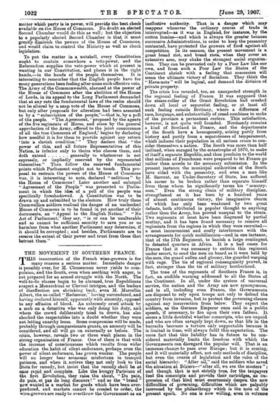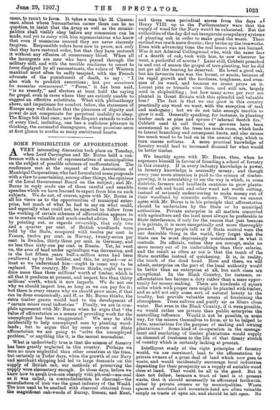many reasons a. serious matter. Immediate danger is posathly over,
for M. Clemencessu never yields to com- pulsion, and the South, even when seething with anger, is not prepared for an armed struggle with the North. The well-to-do classes bogie to be alarmed, true Republicans suspect a Monarchical or Clerical intrigue, and the leaders of disaffection are shrinking back, even M. Marceilin Albert, the so-called " Redeemer," having surrendered, and having declared himself, apparently with sincerity, opposed to any effesimi of blood. An extremely cruel attack by
mob on a detective who was only doing his duty, and whom the crowd deliberately tried to drown, has also shocked the respectables into a doubt whether they were pot letting anarchy low. Some compromise will he made, probably through c,erupa,ssienate grants, an amnesty will be considered, end all will go on externally as before. The estsie, however, reveals two or three weak places in the strong organisation of France. One of thetn is that with the increase of consciousness which reselte from wider education the habit of silent endurance, perhaps oven the power of silent enduraime, has grown, weaker. The people will no longer bear economic misfortune in tranquil patience, and when it arrives they not only look to the State for remedy, but insist that the remedy shall be at CelCa rapid, and eeneplete. Like the hungry Parisians of the first Revolutien, they raise the shout, " Let pain, do pain, et pee de long disceurs " and as the "bread" now wanted, is a market for goods which have been over. produced, and markets cannot be created to order, the wine-growers are ready to overthrow the Government as an ineffective authority. That is a danger Which may reappear whenever thus ordinary course of trade is. interrupted—as it was in England., for instance, by the cotton famine—and which is always the greater because successive Administrations, in order to keep the peasantry contented, have protected the growers of food against all competition. In its essence, the present movement is a great bread riot, and bread riots, when they cover ati exteneive area, may shake the strongest social organisa- tion. They can be prevented only by a Poor Law like our own, and from such a Poor Law the States of the Continent shrink with a feeling that concession will mean the ultimate victory of Socialism. They think the " Ha.vemots " will be logical, and demand the division of private property. The crisis has revealed, too, an unexpected strength in the regional feeling of France. It was supposed that the steam-roller of the Great Revolution had crushed down all local or separatist feeling, or at least all snob feeling outeide Brittany, where a difference of race, language, and substantially of creed combines to make of the province a permanent en4sve. This satisfaction, however, is not quite well founded. Normandy remains a kind of Scotland in France, and the departmeats of the South have e homogeneity, arising partly from history and partly from a separateness of temperament, which induces their population in all serious crises to eon- eider themselves a nation. The South was more than half Melined, when enraged by the catastrophe of 1870, to make of itself a separate Republic, and thus proclaim to the world that milliees of Frenchmen were prepared to let Fraece go rather than accede to the necessary submission. In the present instance the municipal authorities of the South have sided with the peasantry, and even a man like M. Serraet, an Under-Secretary of State, has suffered his career to be broken rather than separate himself from those whom be significantly terms his " country- men." Even the strong chain of military discipline, strengthened as it has been by a hundred years of almost continuous victory, the imaginative charm of which has only been weakened by two great defeats, berth attributed in popular thought to anything rather than the Army, has proved unequal to the strain. Two regiments at least have been disgraced by partial mutiny, and it has been found necessary to remove all regiments from the regions in which they were recruited,— a most inconvenient and goat's, interference with the arrangements for quick mobilisation—and in one instance, that of the 17th Regiment, to banish a larke contingent, to detested quarters in Africa. It is a bad omen for France that it was necessary to entrain this regiment under escort, to send the men on board as it were held by the ears, the guard sullen and gloomy, the guarded weeping with rage. The tie of regional cousmigetnity proved, in fact, stronger than the tie of military brotherhood.
The tone of the regiments of Southern France is, in fact, an audible warning addressed to all the States of the Continent. In all, under the system of universal service, the nation and the Army are now synonymous, and in all, including even France, the Governments are disposed to rely upon troops not only th defend the country from invasion, but to protect the governing class% against any insurrection from below. They expect the eoldiers, as the German Emperor once said in is publie speech, if necessary, to fire upon their owe fathers, It seems a little doubtful whether conscripts, who are unpaid and who are often, savagely kept down, so that life in the barracks becomes a torture ordy supportable because it is limited in time, will always fulfil this expectation. The mere fact that this liability has in future to be con- sidered materially limits the freedom with which, the Governments can disregard the popular will. That is an immense change to pass over Europe; but it is coming; and it will materially affect. not only methods of discipline, but even the course of legislation and the rules of the ocial hierarchy. "After all," said the soldiers who *eyed the situation at 134:elors---" after all, we are the masters " ; azia though that is not strictly true, for the taxpayer, feed the conscript* and provide their Cartridges, oil TM, presaion of that Wad must enormously deepen the new difficultiee of governing, difficultiee which are palpably increased by the philanthropy which is the note of the present epoch. No one M pow willing, even in eztreme cases' to resort to force. It takes a man like 11. Clown. epee, ebout whose humanitarian career there can he no question, to insist that the 4rmy as well as the munici- palities ehall visibly obey before any concession can be made, and yet to carry with him representatives who know that even if massacres succeed they are never sincerely forgiven. Responsible rulers have now to prove, not only that they have restored order, but that they have restored it without any effusion of unnecessary blood. When all the insurgents are men who have passed through the military mill, and with the terrible readiness to resort to force displayed by all remonstmnts, the rulers of Western Mankind mist often be sadly tempted, with the French advocate of the punishment of death, to say : "I also wish to prohibit executions ; but que messieurs lea assassins commencent." "Force," it has been said, "is no remedy," and electors at least hold the saying for gospel, even in cases where they are entirely unable to suggest an effective substitute. What with philanthropy above, and impatience for comfort below, the statesmen of Europe may well declare that the pleasures of dignity and power do not compensate for perpetual inability to sleep. The Kings felt that once ; now the disquiet extends to rulers of every kind, including, one has a malicious pleasure in thinking, the successful demagogues, whose promises seem at first glance to soothe so many embittered hearts.

















































 Previous page
Previous page